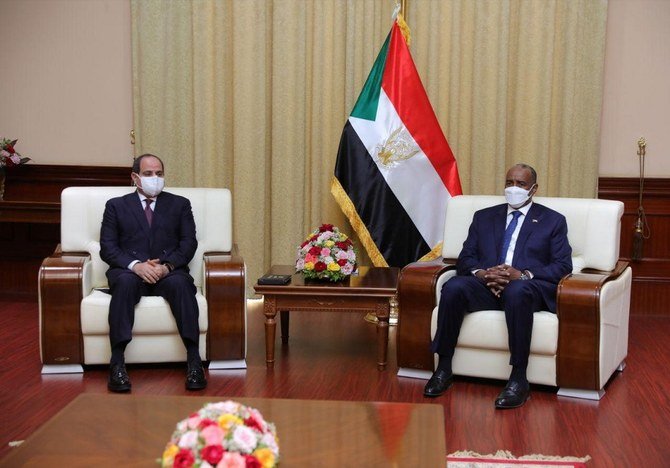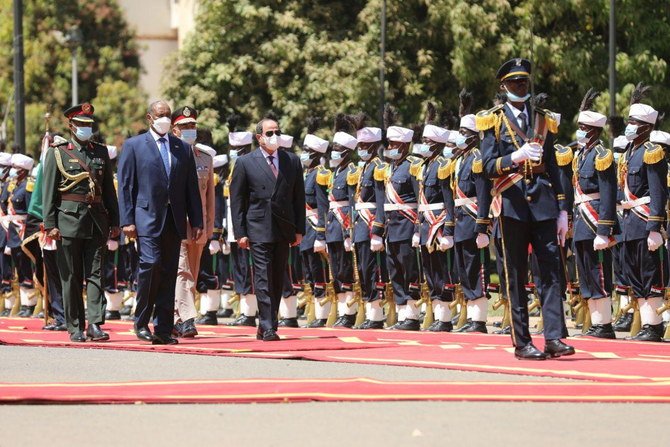



Mohammed Abu Zaid
CAIRO: Egyptian President Abdel Fattah El-Sisi visited Sudan on Saturday for the first time since the overthrow of former President Omar Bashir, as the neighbors push to break a deadlock over a multi-billion dollar dam being built by Ethiopia.
During his meeting in Khartoum with Abdel Fattah Al-Burhan, chairman of the Sovereignty Council of Sudan, El-Sisi said it was his firm belief that the security and stability of Sudan was an integral part of the security and stability of Egypt.
A statement from the Egyptian presidency reflected an agreement between El-Sisi and Al-Burhan that the current stage of the dam discussions required the highest levels of coordination between the two countries.
It said that Egypt supported the Sudanese proposal to form an international quartet, including the presidency of the African Union, the US, the EU and the UN, to mediate in the dam issue.
El-Sisi and Al-Burhan agreed to reject any unilateral measures aimed at monopolizing the resources of the Blue Nile.
Both leaders discussed ways to strengthen bilateral relations at all levels, as well as several regional and international issues of common interest, especially developments in the situation in the Sudanese-Ethiopian border region, and the recent Sudanese moves to extend state sovereignty over its eastern borders bordering Ethiopia.
They also discussed developments in the Horn of Africa and East Africa. The discussions, according to the Egyptian presidency, reflected a mutual understanding about ways to deal with issues in a way that ensured the enhancement of African capabilities to face the challenges facing the continent as a whole.
Al-Burhan appreciated Egypt’s stance in support of Sudan to face the repercussions of various crises, as well as to contribute to removing Sudan’s name from the US list of countries sponsoring terrorism.
He affirmed Sudan’s aspiration and keenness to activate joint projects between Egypt and Sudan and to enhance the prospects for cooperation, especially at the political, economic, security and military levels.
El-Sisi confirmed Egypt’s continued support for the government and people of Sudan, and interest in upgrading bilateral relations in a way that enhanced the strategic partnership based on mutual respect and cooperation for the benefit of the two countries.
There has been high-level diplomatic and military activity between the two countries in recent days.
The Sudanese Minister of Foreign Affairs Maryam Al-Mahdi met El-Sisi and her Egyptian counterpart Sameh Shoukry in Cairo on Tuesday.
The Chief of Staff of the Egyptian Armed Forces Mohamed Farid concluded a two-day visit to Khartoum, during which an agreement was signed for cooperation in the fields of military training and coordination.
On Friday, the UN offered to help move forward the negotiations between Egypt, Sudan and Ethiopia over the GERD that Ethiopia is building 15 kilometers from the Sudanese border, at an estimated cost of $5 billion.
In a phone call with UN Secretary-General Antonio Guterres on Friday, Shoukry “stressed the need to launch a serious and effective negotiation process” over the dam before a second round of filling expected this summer, Reuters news agency reported.
Ethiopia, which says it has every right to use Nile waters, started filling the reservoir behind the dam last summer after Egypt and Sudan failed to secure a legally binding agreement over the hydropower dam’s operation.
Sudan fears the dam could increase the risk of flooding and affect the safe operation of its own Nile dams, while water-scarce Egypt fears its supplies from the Nile could be hit.
Years of diplomatic talks over the project have repeatedly stalled.